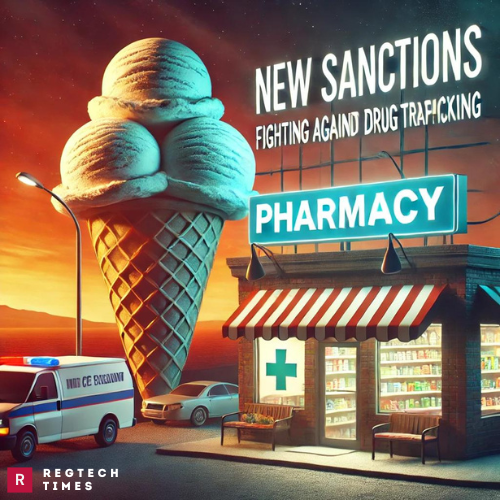In a significant move to curb the financial activities of the Sinaloa Cartel, the U.S. Treasury Department recently announced sanctions against two Mexican businesses allegedly tied to the cartel’s illegal drug trade. These businesses, a chain of ice cream shops and a pharmacy, have been accused of using proceeds from fentanyl trafficking to finance their operations. The sanctions mark a further effort by the U.S. government to dismantle the cartel’s money laundering operations and mitigate the devastating effects of fentanyl in the United States.
The Office of Foreign Assets Control (OFAC), the U.S. Treasury branch responsible for enforcing economic sanctions, identified two entities linked to the Sinaloa Cartel: Nieves y Paletas, a chain of ice cream shops in Sinaloa, and a pharmacy in the northern state of Sonora. These businesses are believed to have been established using drug trafficking proceeds, highlighting how the cartel launders illicit funds through seemingly legitimate enterprises.
Money Laundering Through Legitimate Businesses
The U.S. government has long recognized the Sinaloa Cartel’s ability to launder vast amounts of money through legal-looking businesses. The Treasury Department’s sanctions targeted Nieves y Paletas, an ice cream chain that operates in the capital of Sinaloa. According to the Treasury, the business was set up by Jesús Norberto Larrañaga Herrera, also known as “El 30,” and Karla Gabriela Lizárraga Sánchez, using illicit proceeds from fentanyl trafficking.
In addition to the ice cream chain, the Treasury also sanctioned a pharmacy and convenience store in Sonora. This business was linked to José Arnoldo Morgan Huerta, known as “Chachio,” who allegedly used drug profits to fund its operations. His brother, Juan Carlos Morgan Huerta, oversees Sinaloa Cartel operations in the border city of Nogales, a key location for the cartel’s drug smuggling activities into the U.S.
These businesses represent just a fraction of the Sinaloa Cartel’s money laundering operations, which include investments in restaurants, timeshares, and other enterprises. By investing in legitimate businesses, the cartel conceals its drug trafficking profits and integrates them into the formal economy, making it harder for law enforcement to trace the origins of the funds.
Azerbaijan Accuses Armenia of Aiding Russia to Evade Western Sanctions
The Sinaloa Cartel and the Fentanyl Crisis
The Sinaloa Cartel has been a dominant force in the global drug trade for decades, but its role in the production and trafficking of fentanyl has made it a particularly dangerous threat. Fentanyl, a synthetic opioid that is up to 100 times more potent than morphine, is responsible for tens of thousands of overdose deaths in the U.S. each year. According to government data, fentanyl contributes to approximately 70,000 deaths annually in the United States, fueling the opioid epidemic.
The cartel sources precursor chemicals for fentanyl production from China and India, then manufactures the drug in clandestine labs in Mexico. Once produced, fentanyl is smuggled across the U.S.-Mexico border and sold on the black market, often disguised as prescription pills. The Sinaloa Cartel plays a critical role in this deadly supply chain, profiting immensely from the synthetic opioid’s sale.
Sanctions as a Tool to Combat the Sinaloa Cartel
The U.S. government has made it a priority to disrupt the Sinaloa Cartel’s financial networks. Sanctions imposed by OFAC prevent designated businesses and individuals from accessing the global financial system. These sanctions freeze any assets they may hold in U.S. banks and prohibit U.S. companies and financial institutions from conducting business with them. This is intended to cut off the financial resources that support the cartel’s operations.
Treasury Deputy Secretary Wally Adeyemo highlighted the significance of utilizing sanctions to counter the cartel’s influence. In his announcement, Adeyemo stated that President Biden and Vice President Harris are committed to using every tool available to combat the cartels poisoning our communities with fentanyl and other deadly drugs.
A Broader U.S. Government Strategy
The sanctions against businesses tied to the Sinaloa Cartel come amid a wider U.S. strategy to address the opioid epidemic and the broader threat posed by Mexican drug cartels. In July 2023, President Joe Biden unveiled several proposals to tackle the fentanyl crisis, including legislation to create a registry for pill presses—machines used to produce counterfeit pills—and increased penalties for drug traffickers involved in fentanyl smuggling.
These efforts also reflect heightened tensions between the U.S. and Mexico over cartel violence and drug trafficking. Mexican President Andrés Manuel López Obrador has criticized the U.S. for its role in the drug crisis, pointing to the American demand for illegal drugs and the flow of firearms into Mexico. The Biden administration, however, has placed the blame squarely on the cartels, with the Sinaloa Cartel at the forefront of fentanyl production and smuggling.
The U.S. Treasury Department’s sanctions against businesses tied to the Sinaloa Cartel are a crucial part of the U.S. government’s broader efforts to combat the fentanyl crisis. By targeting the cartel’s financial networks, these sanctions aim to weaken its ability to launder money and fund its operations. As the U.S. continues its fight against the cartel and the deadly synthetic opioid trade, measures like these play an essential role in disrupting the flow of drugs that have caused untold harm to communities across the United States.


